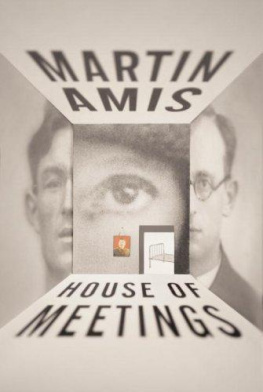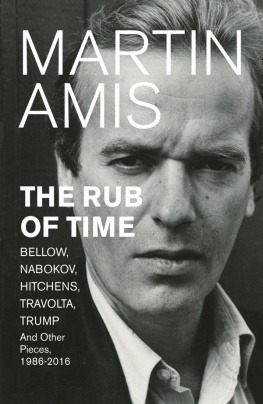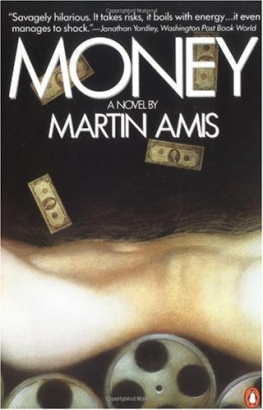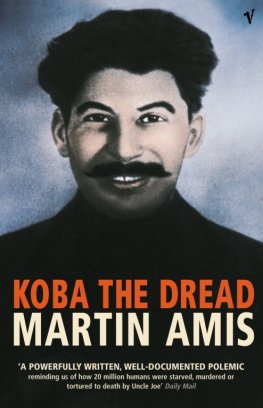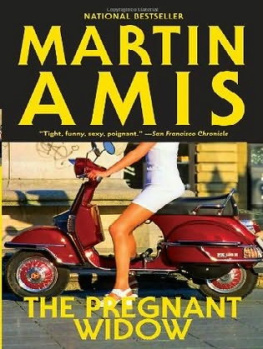Martin Amis - House of Meetings
Here you can read online Martin Amis - House of Meetings full text of the book (entire story) in english for free. Download pdf and epub, get meaning, cover and reviews about this ebook. year: 0, genre: Art / Science fiction. Description of the work, (preface) as well as reviews are available. Best literature library LitArk.com created for fans of good reading and offers a wide selection of genres:
Romance novel
Science fiction
Adventure
Detective
Science
History
Home and family
Prose
Art
Politics
Computer
Non-fiction
Religion
Business
Children
Humor
Choose a favorite category and find really read worthwhile books. Enjoy immersion in the world of imagination, feel the emotions of the characters or learn something new for yourself, make an fascinating discovery.
- Book:House of Meetings
- Author:
- Genre:
- Year:0
- Rating:4 / 5
- Favourites:Add to favourites
- Your mark:
- 80
- 1
- 2
- 3
- 4
- 5
House of Meetings: summary, description and annotation
We offer to read an annotation, description, summary or preface (depends on what the author of the book "House of Meetings" wrote himself). If you haven't found the necessary information about the book — write in the comments, we will try to find it.
House of Meetings — read online for free the complete book (whole text) full work
Below is the text of the book, divided by pages. System saving the place of the last page read, allows you to conveniently read the book "House of Meetings" online for free, without having to search again every time where you left off. Put a bookmark, and you can go to the page where you finished reading at any time.
Font size:
Interval:
Bookmark:
3. The Salang Tunnel
And leave she did, on October 29, 1962.
It was the day after the defusing of the Cuba Crisis. And this imparted a false perspective. Zoya leaving Lev: that wasnt the end of the world. Not for me, anyway. Was there a precipitant? Kitty herself, who went down there and even cross-questioned the mother, never established the details, though she claimed to sense the aftershock of scandalWe knew that Zoya had gone back to her job at the school. Teaching drama. And we knew that she had been summarily dismissed. She was in Petersburg, where old Ester was about to join her. Lev was still in their half of the hovel near Kazan.
I didnt see him for nearly a year. But we wrote. This is what happened to him.
In my first letter I made a practical suggestion. I offered to buy him his Certificate of Rehabilitation, just as I had bought mine some years earlier (and just as I would soon buy my Party card). He took me up on it and asked, in addition, for a large loan, appending a repayment schedule that included calculations for interest. Surveying this schedule, with its percentages, its busy decimals, I felt a cavernous bewilderment. Lets put it that way, for now. The big brother in me was, of course, delighted that Zoya had gone. What bothered me was Levs response to it: a repayment schedule that ventured far, far into the future. Why wasnt it the end of the world?
That October he successfully applied for a job in a mine-construction project in Tyumen, just the other side of the Urals, beyond Yekaterinburg. At Christmas he sent me a photograph of a freckled and bespectacled blonde, standing in a striplit corridor with her hands behind her back. This was the twenty-three-year-old he had met in the works dispensary: little Lidya. I will mention here that in his covering letter my brother confessed to some reactionary pride in the fact that Lidya was or had been a virgin. Looking again at the photograph, I had to say that I wasnt at all surprised. I quietly concluded, too, that I wasnt interested in virgins. Naturally I wasnt. What would I do with a virgin? What would we find to talk about all night?
In the new year, in February, he got promoted and she got pregnant. Now, Lev was still a married man, and divorce wasnt as easy as it used to be. Divorce used to be very easy indeed. You didnt even have to go through the rigmarole required of our Muslim brethren, who got divorced by saying I divorce thee three times. In the Soviet Union you only had to say it once, on a postcard. But now, for reasons well return to, both parties were obliged to attend a court hearing. I couldnt understand why Zoya refused to cooperate, nor could Kitty. Lev felt it prudent to go to Petersburg. As soon as he told her that Lidya was, as the Latins say, embarazada (have I got that right?), Zoya complied; and then it was just bureaucracy.
I was best man at the August wedding. My brother seemed much leaner (amazingly, some of his hair had grown back), Lidyas pious parents seemed at last assuaged, and it all went fairly well, considering that Lidya, as Kitty put it, was out here. Lidya was long and thin, with legs the shape of noodles another Kitty, another Chile. I found her to be pretty much as far as you could get from Zoya, which is another way of saying that she didnt look very feminine, even as she entered her third trimester. Already the baby dwarfed her. She was like the string on the package. A seven-kilo son, Artem, was duly delivered in November.
Zoya stayed on for a while in Petersburg with her mother. She got involved with the famous Puppet Theater there, making puppet costumes, painting puppet scenery. When the Puppet Theater opened up a subsidiary in Moscow, Zoya was part of the team that came along to run it. In a long, new-broomist letter to Kitty, she said that it was her intention, now, to return to the life of the heart. She and her mother had their old place back, too. So, once again, Zoya was entertaining in the conical attic.
Kitty called on her, of course. I didnt. I didnt return to the old neighborhood and stand beneath her window. I didnt linger there in all weathers, trying to interpret the movements of shadows on the ceiling of her bedroom. Something else had to happen first. Something that might take a very long time.
Nikita Sergeyevich fell. Leonid Ilich rose.*5 The Thaw, then the Little Freeze, then the Stagnation.
My lovelife, as I will go on calling it, took an unexpected turn. I was getting older. The croupiers were getting older. They werent real croupiers though in my recurring dream about Varvara (the last in the line) she stood over a chip-strewn wheel of fortune, and her rake kept turning into a lorgnetteIt is hard to get a smile from a good-time girl once she passes the age of forty. Their thoughts are all of solemnization. I tried a couple of younger ones; but with them I always felt that I was on the wrong train or the wrong boat, that the other passengers had different tickets and itineraries, different stamps, different visas. And the whole black-market milieu lost most of its pep after the law of 1961, which gave the economic criminal something new to worry about: capital punishment. So I partly reformed, and joined my generation, entering into a series of more tenacious, more complicated, and (certainly) much cheaper relationships with the children of the Revolution, divorces, veteran widows, ex-convicts, ex-exiles, all of them fatherless, all of them brotherless. In 1969, on a working trip to Hungary, I met Jocelyn, with whom I more or less cohabited, on and off, until the events of 1982the Salang Tunnel, and what followed from it.
By 69 I had found my mtier. Robotics, but not yet in its medical applications. To get your hands on materials of international standard, you had to do space or you had to do armaments. Space was oversubscribed, so I did armaments. Rotary launchers for nuclear weapons. Thats right, my child: preparations for the third world war. The third world war never became the Third World War, which is just as well. In my current mood, not notable for its leniency, I wouldnt enjoy it reproaching myself for the Third World War.
I had my own chauffeur-driven Zigli. I shopped in the subterranean valuta arcades. Not very often, about once a year, I would amass a parcel of silk shirts and silk scarves and silk stockings, and scents and unguents and elixirs, and blushers and highlighters and concealers, and send it, without any covering note, to the occupant of the conical attic.
You need to know something about Jocelyn. The main theme of her character was melancholy melodramatic melancholy. Sad enough in Budapest, Jocelyn was suicidal in Moscow. She carried melancholy around with her, maybe in her handbag, a black and bottomless entanglement of frayed embroidery; or maybe in her hair (another entanglement) it chose to lurk. Her obsession was transience. Oh yes: change and decay in all around she saw. What she feared was the void. Going to sleep was for Jocelyn an existential torment; if she turned in early, you had to rig up a wireless or a gramophone, and she wanted the light on and the door open. The reason for all this, you were led to understand, was the high sensitivity enforced by exceptional intelligence. The more intelligent you were, the more depressed you were bound to get. She could have been the male lead in one of the more forbidding novels of Dostoyevsky. And she was English. Her husband, soon to be estranged, was number two at the British Embassy in Budapest. Jocelyn Patience Harris was a frump and a joke, as well as a door-darkener of mythic power. There were several reasons for the attraction. Chief among them was snobbery.
She was also basically handsome, and rich, and literary, in her way. She never went anywhere without her four or five leather-bound anthologies, or treasuries, of Georgian verse. These we read together. With a new language, of course, the last thing you learn is taste; and for years I would be trying to impress everybody with my marathon memorizations of people like Lascelles Abercrombie and John Drinkwater. At the same stage, my idea of a colloquial English sentence was one that contained lots of phrases like in the nick of time and by hook or by crook. Do you know the expression a disgusting Anglophile? Thats what I became. And it
Next pageFont size:
Interval:
Bookmark:
Similar books «House of Meetings»
Look at similar books to House of Meetings. We have selected literature similar in name and meaning in the hope of providing readers with more options to find new, interesting, not yet read works.
Discussion, reviews of the book House of Meetings and just readers' own opinions. Leave your comments, write what you think about the work, its meaning or the main characters. Specify what exactly you liked and what you didn't like, and why you think so.

